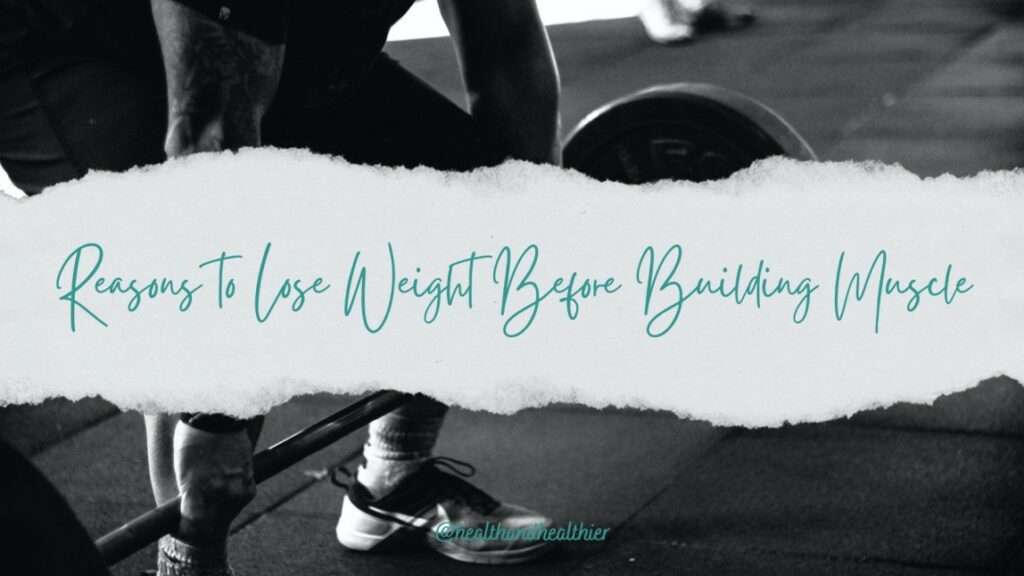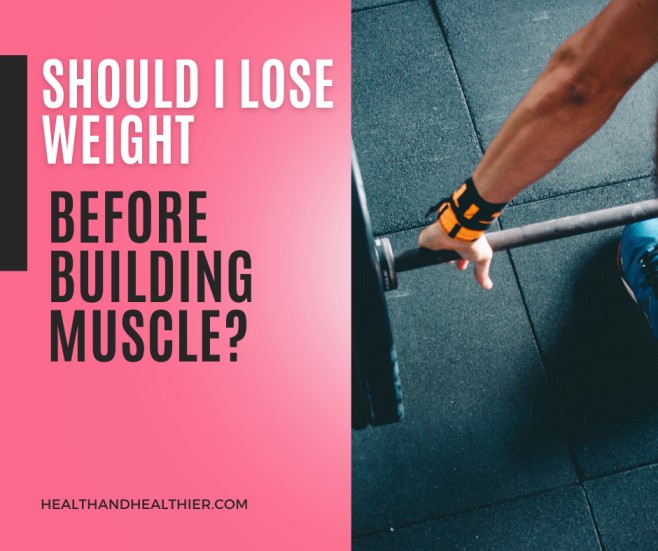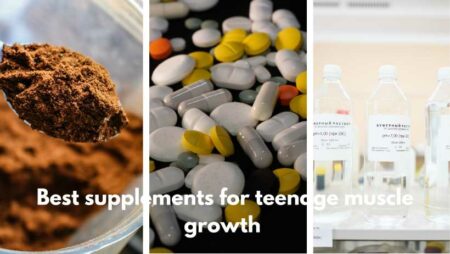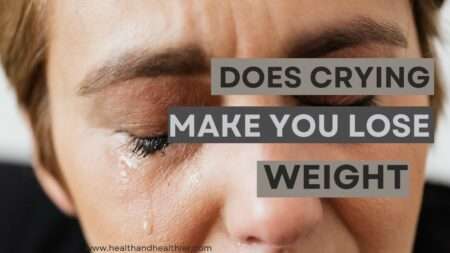If you’re someone who’s been considering building muscle, you may be wondering whether you should lose weight first. It’s a common question, and the answer isn’t always straightforward. In this article, we’ll explore the difference between losing fat and losing weight, how to know if you need to lose fat before building muscle, reasons to lose weight before building muscle, reasons not to lose weight before building muscle, and whether you can lose fat and gain muscle at the same time.
Table of Contents
Losing Fat vs. Losing Weight
Ah, the eternal struggle of losing weight. For many of us, it’s a constant battle to shed those stubborn pounds, and we often turn to crash diets and extreme exercise regimens in an attempt to see results quickly. But is losing weight the same thing as losing fat? Not necessarily. In fact, it’s important to understand the difference between the two if you want to achieve long-term success in your weight loss journey.
Let’s start with the basics. Losing weight simply means that the number on the scale is going down. This can happen for a variety of reasons – maybe you’re eating fewer calories, exercising more, or drinking more water. While losing weight can be a positive step towards a healthier lifestyle, it’s important to note that not all weight loss is created equal.
When we lose weight, we’re not just losing fat – we’re also losing muscle, water weight, and even bone density. This is why crash diets and extreme exercise regimens can be so damaging – they often result in rapid weight loss that isn’t sustainable or healthy in the long run.
On the other hand, losing fat specifically means that you’re decreasing your body fat percentage while maintaining or even increasing your muscle mass. This is a more sustainable approach to weight loss, as it focuses on changing your body composition rather than just reducing your overall weight.
So, how can you go about losing fat instead of just weight? Here are a few tips:
- Strength training: Incorporating strength training into your exercise routine can help build and maintain muscle mass while also burning fat.
- Eat a balanced diet: Instead of drastically cutting calories, focus on eating a well-rounded diet that includes plenty of protein, healthy fats, and complex carbohydrates.
- Stay hydrated: Drinking plenty of water can help flush out toxins and keep your body functioning at its best.
- Get enough sleep: Lack of sleep can interfere with hormone levels and metabolism, making it harder to lose fat.
Remember, the goal shouldn’t just be to see a lower number on the scale – it should be to improve your overall health and well-being. By focusing on losing fat instead of just weight, you can achieve a more sustainable and healthy approach to weight loss.
ALSO READ – Detox drinks to lose weight
Do You Need to Lose Fat Before Building Muscle?
If you’re carrying excess fat, you may benefit from losing some of it before focusing on building muscle. Here are some signs that you may need to lose fat first:
- You have a high body fat percentage (generally above 25% for women and 20% for men)
- You have a lot of fat around your midsection
- You’re carrying excess weight that’s affecting your health (e.g., high blood pressure, type 2 diabetes)
In these cases, losing fat can help improve your overall health and make it easier to build muscle in the long run.
Also read – Can Kombucha help you to lose weight?
Reasons to Lose Weight Before Building Muscle

If you’re considering hitting the gym and transforming your body, you may be wondering whether you should lose weight or build muscle first. While the answer may seem straightforward, the truth is that it depends on your individual goals and body type. However, in this article, we will explore the reasons why losing weight before building muscle may be the better choice.
- Losing weight before building muscle can provide you with a clean slate. By shedding excess fat, you’ll have a better idea of your starting point and can more accurately measure your progress. When you have a significant amount of excess weight, it can be difficult to gauge the effectiveness of your muscle-building efforts. By losing weight first, you’ll have a clearer idea of how your body is responding to your exercise routine and diet.
- Another reason to prioritize weight loss over muscle gain is that losing weight can actually make it easier to build muscle. When you carry excess fat, your body has to work harder to perform physical activities. This can make it more difficult to push yourself during workouts and can result in slower muscle growth. By losing weight first, you’ll be able to move more easily and perform exercises with greater intensity, leading to faster muscle development.
- Losing weight before building muscle can have significant health benefits. Carrying excess weight can increase your risk of numerous health problems, including heart disease, stroke, and diabetes. By shedding excess fat, you’ll not only improve your physical appearance but also your overall health and well-being.
- Losing weight first can help you build a foundation of healthy habits that can support your muscle-building goals. By focusing on healthy eating habits and regular exercise, you’ll be setting yourself up for long-term success. Once you’ve achieved your weight loss goals, you can shift your focus to building muscle while maintaining your healthy habits.
ALSO READ – Fruit yogurt recipes for weight loss
Reasons Not to Lose Weight Before Building Muscle

When it comes to fitness goals, many people think that the first step towards achieving the body of their dreams is to shed off those unwanted pounds. But is losing weight really the best strategy, especially for those who aspire to build muscle mass? Here are some reasons why losing weight before building muscle might not be the best approach for everyone.
Muscle Mass Matters
Building muscle mass requires a caloric surplus, which means that you need to consume more calories than your body burns. This is because muscles require energy to grow and maintain, and without adequate calorie intake, your body may turn to muscle tissue as a source of energy, sabotaging your muscle-building efforts. When you lose weight, you not only lose fat but also muscle mass, which makes it harder to build the muscles you desire.
Performance Suffers
Losing weight can make you feel weak and sluggish, which can affect your workout performance. If you’re not consuming enough calories, you may find yourself feeling lethargic and unable to perform at your best during workouts. This can make it difficult to lift heavy weights or complete your desired number of reps and sets, hindering your muscle-building progress.
Risk of Injury Increases
Weight loss can lead to a decrease in bone density and muscle mass, which increases the risk of injury during workouts. Without sufficient muscle mass, your joints may bear more of the weight, increasing the risk of joint injuries. Similarly, low bone density makes bones more susceptible to fractures and breaks during high-impact exercises. Building muscle mass, on the other hand, can help protect your joints and bones by providing better support and stability.
Slow Progress
Losing weight and building muscle are both challenging goals that require time and dedication. If you try to achieve both goals simultaneously, you may find yourself spreading your efforts too thin, which can slow down your progress. Focusing on one goal at a time can help you achieve better results in the long run.
Mental Health
Losing weight can be a mentally taxing process that requires strict adherence to a calorie-restricted diet and a consistent exercise routine. This can lead to feelings of deprivation and frustration, which can negatively impact your mental health. Focusing on building muscle instead can provide a more positive and rewarding experience, as you see your strength and endurance increase over time.
Can You Lose Fat and Gain Muscle at the Same Time?
Losing fat and gaining muscle simultaneously – is it a myth or a reality? This is a question that perplexes many fitness enthusiasts, bodybuilders, and gym-goers alike. Is it possible to burn fat and build muscle at the same time, or is it a pipe dream? The answer to this question is not as straightforward as one might think. In this article, we will explore the science behind fat loss and muscle gain and try to unravel the mystery behind this intriguing question.
Also read – Does Sweating Help You Lose Weight?
The science behind weight loss and muscle gain
First and foremost, let’s talk about the science behind fat loss and muscle gain. Fat loss occurs when your body burns more calories than it consumes, leading to a calorie deficit. This deficit forces your body to tap into its fat stores to get the energy it needs, resulting in weight loss. On the other hand, muscle gain occurs when your body is in a calorie surplus, meaning it consumes more calories than it burns. This surplus provides the extra energy needed for muscle growth and repair.
So, the simple answer to the question is that it is not possible to lose fat and gain muscle at the same time. How can you be in a calorie deficit and a calorie surplus simultaneously? However, the truth is not that simple. Recent studies have shown that it is possible to build muscle while losing fat, but the process is slow and requires specific conditions.
The main factors
One of the most important factors to consider is protein intake. Protein is essential for muscle growth and repair and also plays a crucial role in fat loss. A high-protein diet can help preserve muscle mass while in a calorie deficit and provide the necessary amino acids for muscle growth. Additionally, strength training and resistance training can help preserve muscle mass while losing fat.
Another critical factor to consider is the type of training you do. Cardiovascular exercises like running, swimming, or cycling can help you burn calories and lose fat. Still, they are not optimal for building muscle mass. Strength training, on the other hand, can help build muscle mass while burning calories, making it the best type of training for simultaneous fat loss and muscle gain.
Moreover, the intensity and volume of training are crucial. It is possible to overtrain, which can hinder muscle growth and cause muscle loss. Finding the perfect balance between training volume, intensity, and recovery is key to simultaneous fat loss and muscle gain.
While it is not entirely possible to lose fat and gain muscle simultaneously, it is possible to build muscle while losing fat. To achieve this, you need to pay attention to your protein intake, engage in strength training, find the right balance between training volume and intensity, and give your body enough time to recover. Remember, the process is slow, and results may not be visible immediately, but with patience and consistency, you can achieve your fitness goals.
Conclusion
In conclusion, whether you should lose weight before building muscle depends on your individual goals and circumstances. If you have excess fat to lose, focusing on weight loss first may be beneficial for your overall health and muscle-building efforts. However, if you’re already at a healthy weight, it may be more effective to focus on building muscle while maintaining a healthy diet and lifestyle. Remember, the most important thing is to prioritize your health and listen to your body’s needs.





